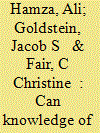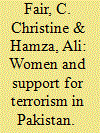|
|
|
Sort Order |
|
|
|
Items / Page
|
|
|
|
|
|
|
| Srl | Item |
| 1 |
ID:
154353


|
|
|
|
|
| Summary/Abstract |
In this research note we employ the work of Wiktorowicz who suggests that persons who are knowledgeable of Islam may be more capable of critically evaluating the claims of militant recruiters and ideologues and thus be more resistant to their appeals than those who are not knowledgeable. This gives rise to an interesting research question: Does knowledge of Islam reduce support for Islamist militancy? To evaluate this research question, we employ data derived from a nationally representative survey fielded among 16,279 Pakistanis in 2011. Using several survey items, we construct a “knowledge index” to measure respondents’ basic knowledge of Islam, which is our principal independent variable. To operationalize support for militancy we use two survey items that query respondents about their support for two prominent Islamist militant groups based in and from Pakistan: the Afghan Taliban as well the sectarian group, Sipah-e-Sahaba-e-Pakistan (also known as Lashkar-e-Jhangvi and Ahle Sunnat Wal Jamaat). We use ordinary least squares regression to evaluate the impact of our independent variables upon support for these two groups, controlling for other relevant factors. We find that knowledge of Islam does predict less support for these two groups; however, other variables such as sectarian organization and ethnicity have greater predictive power.
|
|
|
|
|
|
|
|
|
|
|
|
|
|
|
|
| 2 |
ID:
163211


|
|
|
|
|
| Summary/Abstract |
While there have been many scholarly inquiries about the sources of support for terrorism among Muslim publics, to date, scholars have generally not asked whether or not gender predicts support for Islamist militancy. Instead, most scholars and officials assume that “men of military age” are the most important segment of interest. Instead, gender is usually treated as a “control variable” rather than a “study variable,” reflecting the paucity of interest in this subject. This is likely an important scholarly and policy-analytic oversight. Many terrorist groups have women’s wings and women-oriented publications and other outreach programs because they understand the important role that mothers, wives, and sisters play in a male family member’s decision to take up arms with a terrorist group. In some conflicts, women also join as combatants. In this paper, we seek to address these scholarly lacunae by examining gender-wise support for two militant groups based in and operating from Pakistan: the Afghan Taliban, which has no female outreach program, and the sectarian Sipha-e-Sahaba-e-Pakistan, which does. We leverage a dataset drawn from a relatively large national survey of Pakistanis collected in 2011 to model support for these groups using gender as an independent variable along with other demographic and control variables. We find that females are significantly more likely to support the sectarian group with a women’s outreach-wing. In contrast, there is no significant gender effect on support for the Afghan Taliban. We argue, from these results, that gender deserves more attention in understanding who supports and participates in Islamist militancy.
|
|
|
|
|
|
|
|
|
|
|
|
|
|
|
|
|
|
|
|
|